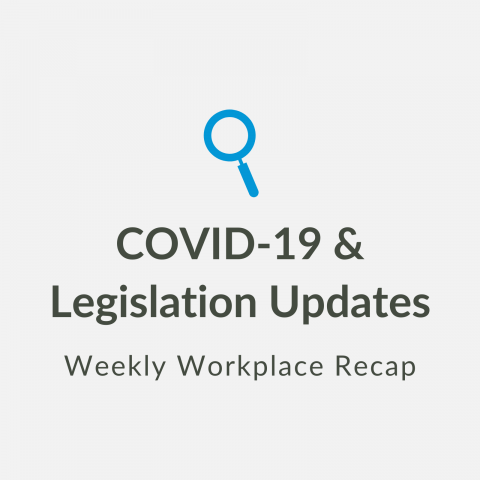COVID-19 & Legislation Updates | Workplace Recap from June 3 to June 16, 2022

Below are the key COVID-19 & legislation topics that touch on the workplace from June 3 to June 16, 2022.
Federal
Canada lifts final vaccine mandate for federal employees
Starting June 20, 2022, vaccination against COVID-19 will no longer be required for federally regulated transportation workers.
Employers in the federally regulated air, rail, and marine sectors will no longer be required to have mandatory vaccination policies in place for their employees.
In addition, the Canadian government said it is also suspending its Policy on COVID-19 Vaccination for the Core Public Administration (CPA) Including the Royal Canadian Mounted Police.
This means that CPA employees will no longer be required to be vaccinated as a condition for employment, while those placed under administrative leave without pay will soon be contacted by their managers to arrange their return to the workplace.
Ontario
Ontario mask mandates expire for public transit and health-care settings
Most of Ontario’s remaining COVID-19 mask mandates were lifted on Saturday, June 11. However, masking will still be required in long-term care and retirement homes.
The province's mask mandate was originally supposed to expire back in April 27 but was extended until June 11 because of the pandemic's sixth wave.
While most mask mandates have expires, businesses may still implement their own.
Alberta
Bill 17 receives royal assent and expands bereavement and reservist leaves
On May 31, 2022, Alberta’s Bill 17, Labour Statutes Amendment Act, 2022, received Royal Assent, and the following amendments to Reservist Leave and Bereavement Leave in the province's Employment Standards Code came into force.
Reservist Leave
The entitlement to reservist leave for training purposes is no longer restricted to “an amount up to 20 days per calendar year.” With the removal of that limit, employees who have completed at least 12 consecutive weeks with an employer may now take as much unpaid leave as they require to participate in reservist training.
Bereavement Leave
The entitlement to three days of unpaid bereavement leave in a calendar year for an employee who has been employed by the same employer for at least 90 days is expanded to include the occurrence of the following situations:
- the employee’s pregnancy, or their spouse’s or common-law partner’s pregnancy ends in other than a live birth; and
- a person’s pregnancy ends in other than a live birth and the employee would have been a parent of that child.
This expansion includes the end of a pregnancy due to miscarriage, stillbirth, and abortion. It also makes bereavement leave available should such an event occur to eligible employees who are biological and adoptive parents, and parents whose children are being carried by gestational carriers/surrogates.
ConnectsUs HR's Alberta Employee Handbooks have been updated to reflect these legistated changes.
British Columbia
WorkSafeBC reminding employers to prepare for flooding and have evacuation plans in place
Due to recent flood warnings for parts of B.C., WorkSafeBC is reminding employers of their responsibility to prepare for the risk of flooding — including planning for evacuation and rescue.
Under the Occupational Health and Safety Regulation — specifically sections 4.13 through 4.16 and Part 32 on emergency preparedness, response, evacuation, and rescue — all employers are expected to plan, prepare, and train their employees for all emergencies.
WorkSafeBC has resources available for employers to prepare for and respond to flood risks. Click the link below for resources.


